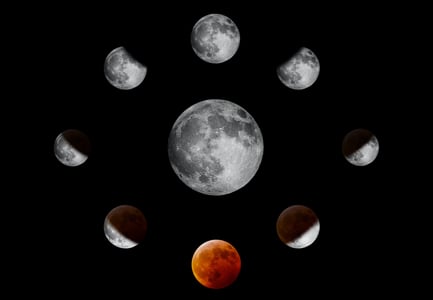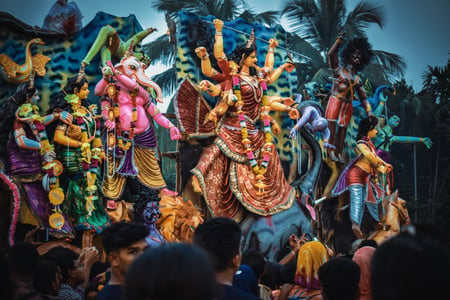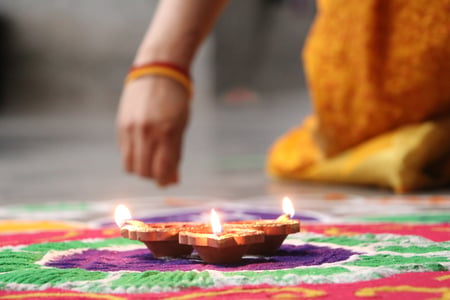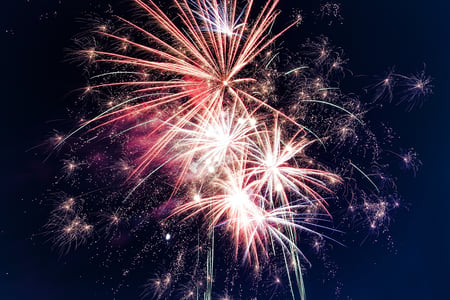It’s no secret where the inspiration for Bondi Chai’s delicious blends originated: India! More specifically, India’s Chai Masala. Every year Indian communities around the world gather together to celebrate Diwali, the Hindu Festival of Lights, and its variations across the other religions practised in India.
Here in multicultural Australia, you’ve no doubt noticed the celebrations currently taking place nearby. If you aren’t of Indian descent, you may have wondered what it’s all about. We’re here to enlighten you…
So, what exactly is Diwali?
The celebration of Diwali – pronounced Divali in English – symbolises the spiritual "victory of light over darkness, good over evil, and knowledge over ignorance" and is usually celebrated for five or six days between mid-September and mid-November. The dates change year to year and are determined by the Hindu Lunisolar calendar. Diwali is considered as significant for the Indian community as Christmas is for the Christians. This year the celebrations began on Monday, 13th November.

📷 Alexander Andrews via Unsplash
Although a definitive date for the first celebration of Diwali is unknown, the festival of lights is mentioned in ancient Sanskrit texts from the latter half of the first millennium, from around 600CE onward.
Legends and Mythology
Depending on which religion you practice, Diwali is connected to a wide array of myths and legends. The foundation story behind the Hindu celebration is that of the return of Prince Rama from exile to his home in the Kingdom of Ayodhya, detailed in the Ramayana.
📷 Wikipedia: Rama leaving for exile
The story tells of Rama’s 14-year banishment due to the scheming of his step-mother to put her own son, Bharata, on the throne when the King retired. Bharata, horrified by his mother’s actions, tracked his brother down at his forest retreat and begged him to return and take the throne back. When Rama refused to defy his father, preferring to stay in his new home in the forest, Bharata promised to rule only as a regent in Rama’s name and keep his seat warm until his brother returned.
After many years of travelling across India with his wife, Sita, and one of his other brothers, Sita is kidnapped by King Ravana of Lanka, an enemy nation. Rama wages war on Ravana and rescues his wife, returns to Ayodhya and is crowned king.
📷 Google Arts & Culture: Rama's return to Ayodhya Rama leaving for exile
There’s a lot more to the story, which you can read about here.
What are the traditions of Diwali?
There are many traditions observed during the Diwali celebrations, many of them surrounding the deities’ worship during this time. The main deities worshipped during Diwali are Goddess Lakshmi (Goddess of Wealth and Good Fortune), Lord Ganesha (God of Obstacles), Lord Kuber (God of Money) and Lord Indra (God of Rain and Storms).

Those who celebrate the festival will use special oil lamps called Diya’s, candles and lanterns to light their homes, temples and workspaces. It is common to place idols within homes and places of religious significance in a specific order, in a north-east direction. Offerings of food and light are made to honour them and receive their blessing. The lamps are expected to burn throughout the Diwali celebrations and are constantly fed with flammable materials such as ghee or oil, even at night.
Other activities that mark the occasion include ritual oil baths at dawn, fireworks, dancing, decorating houses with colourful string decorations called jhalar and floors with rangoli designs.

📷 Sandeep Kr Yadav via Unsplash
Red is one of the main featured colours in all decorations because it signifies prosperity, happiness, love, passion, good luck, and victory over evil.
Much like the Chinese New Year celebration, Diwali is an annual homecoming for families, with everyone wearing new clothes. Families gather for feasts and bring gifts of food to their neighbours in a display of community.
Are there any taboos to avoid?
Absolutely! As with all traditions, there are plenty of no-no’s to keep away from as well.
⊗ NEVER let the Diya flame go out. Tend to it all night if you must; it should always be burning.
⊗ NEVER taste the food while you’re cooking. This sounds like a tricky one (how do you know it’s seasoned correctly, right?), but the reason behind it is that the food must first be offered to the Gods before any human consumption.
⊗ NO gambling or alcohol on the first day of celebrations.
⊗ NEVER gift leather, cutlery or cracker items to family and friends. If you must give these items as presents, include some sweets with them.
⊗ NEVER make loud noises (lighting crackers, clapping, singing too loudly) during the worship of Lakshmi, and placing her alone without Vishnu.
Now, this writer asked the question: isn’t it dangerous to have so many open flames burning in a confined space? After a quick Google search, the answer turned out to be an obvious YES.
In 2022, the New Delhi Fire Service received 166 calls to report multiple house fires during Diwali celebrations. Luckily, there were no casualties. This year so far, there have been outbreaks of more than 41 fires during celebrations across India.
In Melbourne, fireworks set off during celebrations at one temple unfortunately resulted in a grass fire. Fortunately, the blaze was quickly contained, and no one was injured.
It’s strongly recommended that anyone participating in celebrations avoid wearing flammable materials such as silk and synthetics near open flames and not carry crackers or fireworks in their pockets. Safety first!
We wish everyone around Australia and the world celebrating the Festival of Lights a Happy and Safe Diwali!

Have you stepped out to enjoy the celebrations?